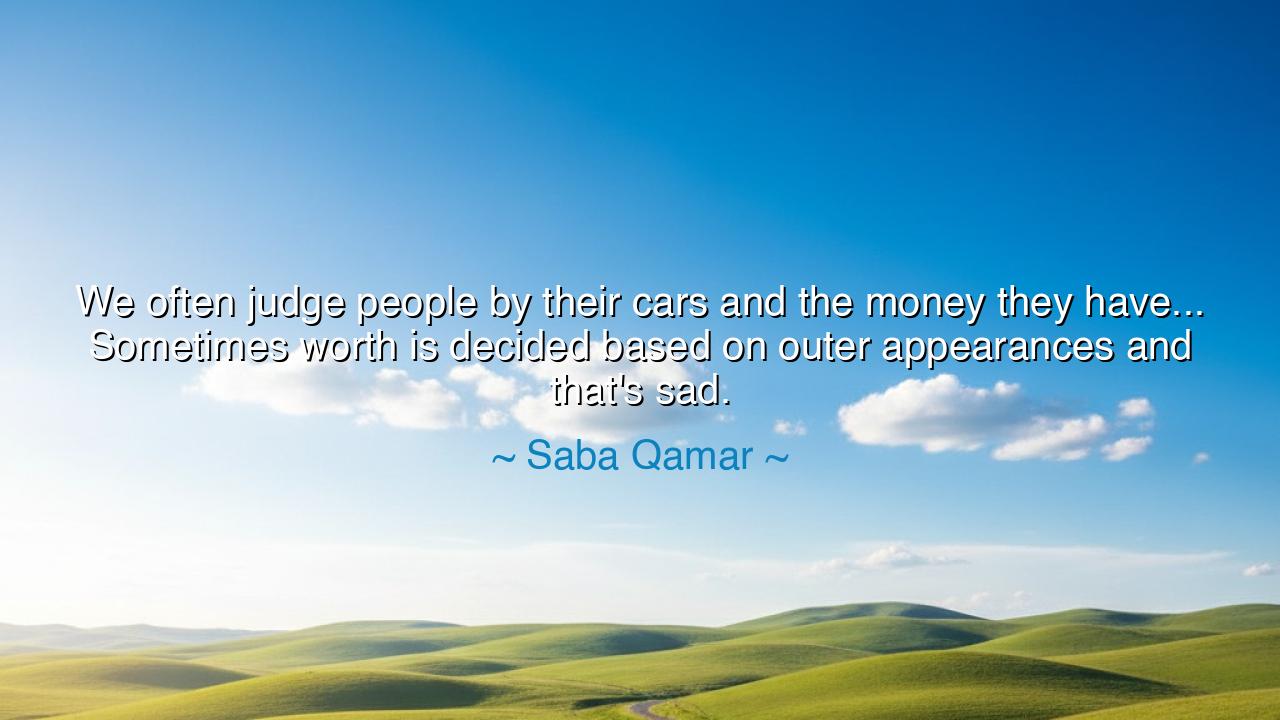
We often judge people by their cars and the money they have...
We often judge people by their cars and the money they have... Sometimes worth is decided based on outer appearances and that's sad.






Hear the voice of Saba Qamar, who speaks not only of society’s folly but of the wound in the human spirit: “We often judge people by their cars and the money they have… Sometimes worth is decided based on outer appearances and that’s sad.” In these words lies a warning, for she unmasks the illusion of wealth and beauty as false measures of value. What is adorned on the outside is fleeting, but what dwells within the soul is eternal. Yet the world, blinded by glitter, often forgets this truth.
The heart of this saying is the distortion of worth. Instead of honoring kindness, wisdom, and integrity, societies too often elevate possessions: the shining vehicle, the costly garment, the heavy purse of gold. Yet such things are fragile. A storm may destroy them, a thief may steal them, time itself will wither them. When worth is judged by such things, the dignity of humanity is diminished, and the true treasure of character is overlooked.
The ancients knew this well. The Stoic philosopher Seneca declared that wealth is not evil, but neither is it proof of virtue. A poor man may be noble, while a rich man may be vile. And in the Gospels, it is written: “What shall it profit a man if he gains the whole world, and loses his own soul?” Across cultures and centuries, the same wisdom resounds—that to mistake appearances for essence is to build life on sand.
History gives us examples both tragic and noble. Consider Diogenes of Sinope, the philosopher who lived in a barrel, owning almost nothing. When Alexander the Great stood before him, asking if he desired anything, Diogenes replied only, “Stand out of my sunlight.” Here was a man judged by appearances as destitute, yet rich in freedom and self-sufficiency. His life still teaches that worth cannot be measured by carriages or coins, but by the independence of spirit.
Yet the sadness that Saba Qamar names is real, for even in our age, the trap of appearances still enslaves hearts. Children are raised to admire luxury before virtue, and men and women are often dismissed because they lack the trappings of wealth. The eyes of the many are clouded, seeing only surfaces, while the soul remains unseen. This sadness is a reminder that much of the world has yet to learn the lessons written in history’s pages.
The lesson for us, children of tomorrow, is clear: judge not by appearances, but by substance. When you meet another, ask not, “What do they own?” but “Who are they in their heart?” Do they speak with kindness? Do they act with justice? Do they carry wisdom? These are the measures of true worth, and they outlast riches or possessions. For when gold rusts and garments fade, character remains.
Practical wisdom calls to us: train your eyes to see beyond the surface. When tempted to admire someone for their wealth, ask yourself if you would honor them without it. When tempted to look down upon one who has little, remember that you see only their circumstance, not their soul. And in your own life, invest more in the cultivation of virtue, wisdom, and compassion than in appearances. For these are the riches that cannot be stolen.
Thus the words of Saba Qamar endure as a mirror and a warning: “Sometimes worth is decided based on outer appearances and that’s sad.” Let us not fall into this sorrow. Let us learn to value people as they are, not as they are adorned, and to honor the unseen treasures of the heart above the fleeting ornaments of the world. For in this lies true justice, and in this lies true humanity.






AAdministratorAdministrator
Welcome, honored guests. Please leave a comment, we will respond soon